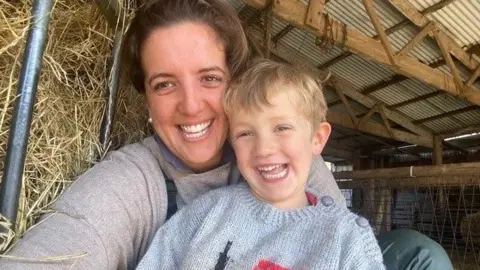‘I’m a circus acrobat – I can’t do school holidays’
 Handout
HandoutMany families struggle to take trips during school holidays because of the cost. For mum Kelly, it’s her job as a circus acrobat.
“I work seven days a week and only get January and February off each year,” she says.
The 32-year-old was fined for taking her daughter Kaida out of school for a two-week holiday to the Canary Islands in January 2024.
Kaida has a main school which she attends week to week from Wednesday to Friday.
On Mondays and Tuesdays, she is registered with other schools around the country as she follows the path of the travelling circus with her mum.
Department for Education (DfE) figures released earlier this week showed the number of fines issued for unauthorised school holidays rose to 443,322 in England last year.
The figures from the 2023-24 school year show a 24% rise on the year before, and are three times higher than in 2016-17, when government records began.
Schools and councils say children should not be out of class during term time because of the impact it can have on their education.
The government says fines have a “vital place in our system, so everyone is held accountable” for ensuring children are in school.
Education Secretary Bridget Phillipson says the problem of school absence has become an “epidemic”.
 Handout
HandoutKelly says it is important to her that Kaida is in full time education, but she says it’s tiring.
“That January and February is super important to us, to have that downtime,” she says.
She says she does not agree with every parent taking their child out of school whenever they want, but believes that if a parent can prove they are unable to take time off during the school holidays, a term-time holiday should be granted.
Kelly says Kaida enjoys school and “loves meeting new people up and down the country” as she follows the circus with her mum.
As well as the cost of going away during the school holidays, some families say they take their kids on holiday during term time because they struggle to cope with busy crowds.
But many parents have also told the BBC that their work commitments make it all the more tricky to get time off during the holidays.
‘Saving £7,000 was a no-brainer’
 Linda Castle
Linda CastleLinda Castle and her husband Nick run a coffee roastery in Leeds and say their “busiest time of the year” is the summer holidays, when they work at festivals across the UK.
“We do about six festivals and we only got a four-day break in the middle of that,” she says.
The couple say they have “always been by the book” with their four children and had never taken any of them out of school for a holiday before last October.
But when the family found a deal which would save them almost £7,000 for a two-week all-inclusive holiday to Tunisia, Linda says it was “a no-brainer”.
They took all four children out of school for two weeks, the first of which was before the half-term break.
“The memories made, the time we spent with the teenagers… What value do you put on that?”
Despite the fine system stating each parent can be fined £80 per child, the family were only given an £80 penalty.
“We just treated is as a tax,” says Linda.
‘We’re lambing during the school holidays’
 Handout
Handout“It’s tricky to go away during school holidays because of how we farm,” says mum Lucy, from East Sussex.
“The week to 10 days we go away in January is important for us.”
The 38-year-old says the school is understanding of the farming family’s circumstances – but can’t authorise their absences.
“In February, when half term arrives, we start lambing our first lot of ewes, by Easter we’re lambing our second lot,” she says.
“By May half-term, my husband is usually silaging, once we get into summer it’s haymaking and harvest. October half-term, he’s usually drilling crops for next year’s harvest, and until recently we farmed turkeys at Christmas.”
Lucy’s family received penalties of £240 for their last holiday and £120 for the one before that. But she says the fines were worth it.
But she says she is worried about taking her children out of school in future.
“I don’t want to have a criminal record, but we’ll cross that bridge when we come to it,” she says.
She says the rules should account for the the different circumstances of different families.
“I think particularly with farming families, that we are all in the same boat,” she says.
How much do you get fined for taking a child out of school for a holiday?
In August 2024, the DfE introduced a new national framework, bringing councils more in line with each other and raising first-time fines from £60 to £80.
However, it says it is the local authority’s responsibility to decide when to issue fines to parents.
The government says, in most cases, schools and local authorities will try to provide support to help improve a child’s attendance – but if this is ineffective or the absence is for an unauthorised term-time holiday, parents may face a fine.
According to DfE guidelines issued in August 2024:
- Schools must consider fines if a child misses five or more days unauthorised
- Fines cost £80 if paid within 21 days, or £160 if paid within 28 days
- If a parent gets a second fine for the same child in three years, it costs £160 immediately
- For a third unauthorised absence, other action like prosecution is considered. A court appearance could result in a fine of up to £2,500.
The DfE says money from fines goes to the local authority.
Education Secretary Bridget Phillipson has said “we need a national effort to tackle the epidemic of school absence”.
“When children miss school unnecessarily, all children suffer, as teachers’ attention is diverted to helping them catch back up, and we will not apologise for ensuring every child is in school accessing high and rising standards so they can achieve and thrive,” she added.
However, Paul Whiteman, general secretary of school leaders’ union the National Association of Head Teachers, said fines are “a crude tool” which “do not address more complex underlying causes of absence.”
He says more resources for community services are needed “to offer vital help with issues which may be impacting children’s school attendance”.







